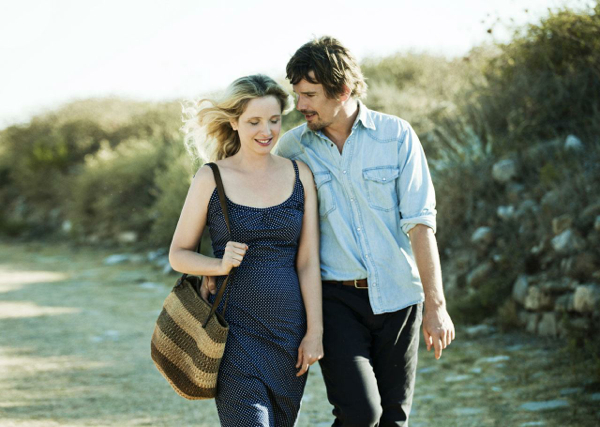Movie review by Greg Carlson
The experience of “Before Midnight,” the third installment of Richard Linklater’s remarkable group of films exploring, among other things, the possibilities of romantic love, calls to mind Robert Browning’s famous lines, “Grow old along with me! The best is yet to be…” What began in 1995 as an impossibly right merger of minimalist plotting and maximalist self-exploration and philosophizing has surprisingly, confidently, and assuredly made the case that sequels can sometimes surpass inaugurations. As Jesse and Celine, Ethan Hawke and Julie Delpy have by now come to feel like two close friends, and we admirers already hope to see them again in another nine years.
Cynics and pessimists need not bother with the “Before” series, ripe as it is with the poetry of spontaneity, love at first sight, and the value of saying yes. That said, “Before Midnight” embraces the changes that accompany post-40 adulthood. Jesse’s missed flight at the conclusion of “Sunset” has led, finally, to a long-term partnership with Celine, and at least one result is a pair of young daughters. “Before Midnight” opens with a sober airport farewell between Jesse and his son Hank, boarding a jet home to America and his mother, the woman Jesse left to be with Celine. It is instantly apparent that Jesse aches to spend more time with his quickly growing child, and the interaction sharply seeds key elements of a conflict that will soon unfold between Jesse and Celine on Greece’s idyllic Peloponnese peninsula.
Like Linklater’s previous treatments of Vienna and Paris, an appreciation of the dreamy, picturesque locations complements the thematic focus on taking chances and seizing happiness. Even so, all of the “Before” movies have made room for careful consideration of mortality and the finite number of moments we have. In the first film, a visit to the Cemetery of the Nameless confronted both the anonymity of death and the way in which time for the dead is suspended (“Now I’m ten years older and she’s still thirteen, I guess”). “Before Midnight” continues the memento mori ruminations, and a spirited dinner conversation attended by participants of many ages and life stages ends in a wistful toast to “passing through.”
Even though “Midnight” eschews the device of an imposed time limit bearing down on Jesse and Celine, a technique essential to “Sunrise” and “Sunset,” the movie’s final act is a tour de force that summons the same kind of panic and urgency we felt as the endings of each of the first two movies approached. What was planned for Celine and Jesse as a kid-free hotel getaway gifted by friends collapses into a bitter display of grievances, accusations, and deeply cutting differences of opinion that no fewer than half a dozen critics have compared to “Scenes from a Marriage.”
One must see “Before Midnight” to appreciate both the detail and the scale of the vicious verbal battle between two idealized projections of our cherished fantasies. My viewing companion, a longtime and committed backer of the “Before” films, expressed her intense feeling of discomfort at bearing witness to the painful blowup. It is unnecessary to say more, since Celine and Jesse have always been best at doing the talking. Like the serpentine twists and turns of fate that challenged our lovers at sunrise and sunset, things are not always what they seem and endings are often just beginnings in disguise.
